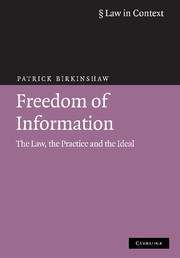Book contents
- Frontmatter
- Contents
- Preface
- Table of statutes
- Table of cases
- Introduction
- 1 Persistent themes and novel problems
- 2 Information and national security
- 3 Government and information: a historical development
- 4 The Freedom of Information Act 2000
- 5 The exemptions
- 6 Decisions and Appeals on FOI Exemptions
- 7 Access to environmental information
- 8 Privacy, access and data protection
- 9 Claims and counterclaims
- 10 Secrecy and access in the European Union
- 11 Openness, information and the courts
- 12 Freedom of information: overseas experience
- 13 Conclusion
- Index
12 - Freedom of information: overseas experience
Published online by Cambridge University Press: 05 June 2012
- Frontmatter
- Contents
- Preface
- Table of statutes
- Table of cases
- Introduction
- 1 Persistent themes and novel problems
- 2 Information and national security
- 3 Government and information: a historical development
- 4 The Freedom of Information Act 2000
- 5 The exemptions
- 6 Decisions and Appeals on FOI Exemptions
- 7 Access to environmental information
- 8 Privacy, access and data protection
- 9 Claims and counterclaims
- 10 Secrecy and access in the European Union
- 11 Openness, information and the courts
- 12 Freedom of information: overseas experience
- 13 Conclusion
- Index
Summary
This chapter will focus upon the role of legislation in other countries, as well as their political practice, in providing and protecting information, whether to or about individuals or, in the case of the USA, committees of the legislature overseeing the operation of legislation and expenditure. I will concentrate on the USA, Canada, Australia and New Zealand. These are countries that, in spite of their enormous differences both between themselves and with Britain, nonetheless possess certain legal cultural similarities with the British system, either through common-law inheritance or through direct or indirect constitutional influence. This chapter will allow us to assess the contribution which overseas practice has made to opening up government, or otherwise, and will also act as a benchmark for our own practice. It should be noted that freedom of information (FOI) laws have faced reactions from executives and legislatures seeking to rein in what are regarded as excesses. We start by examining America where this is certainly true, but in Ireland the FOI Act of 1997 was subject to modification in 2003, which also illustrated a constraint on openness.
Today, over seventy countries possess FOI laws. In addition there are multinational regimes such as the EU laws examined in chapter 10. Germany is a recent recruit with a law coming into effect in 2006. China introduced a law by State Council decree in 2007 to come into effect in 2008.
- Type
- Chapter
- Information
- Freedom of InformationThe Law, the Practice and the Ideal, pp. 459 - 495Publisher: Cambridge University PressPrint publication year: 2010



